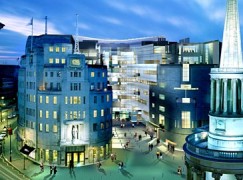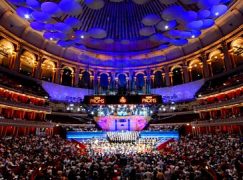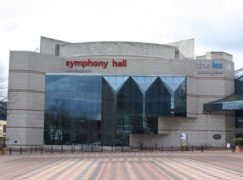Breaking: BBC Radio 3 shifts to the north
mainThe BBC is moving some of its classical staff to Manchester and one of its orchestras to an ‘underserved’ location which has yet to be determined.It’s in line with BBC policy but why can’t they make up their little minds where to put the redundant orchestra?
And why does the controller of Radio 3 have to shuttle up and down every week between Manchester and London, burning ozone holes as he goes?
Bureaucracy has triumphed over broacdasting at Radio 3. W1A rules, ok?
Here’s the press release:
As part of the BBC’s wider commitment to better serving audiences around the UK and basing more staff outside the capital, Radio 3 aims to strengthen significantly its production and leadership base in Salford, while maintaining a strong presence in London. It will also
relocate the BBC Concert Orchestra to a region of England currently underserved by th orchestral sector.
Creating an epicentre for Radio 3 in Salford and adding a new location to its provision of live orchestral music in England will enable Radio 3 and the BBC to bring its work closer to audiences everywhere, further reflect the rich and vibrant classical music and cultural scene of the whole of the UK, and enhance its ability to build stronger connections with communities, artists, talent, creative organisations and audiences around the country.
It will also build on Radio 3’s existing role as a truly national station; more than 30% of its current spending – including on both speech and live music programmes – is outside London through the work of the BBC’s Orchestras & Choirs in Cardiff, Glasgow, Belfast and Salford, and through partnerships with other orchestras and ensembles, festivals, venues, creative organisations and independent production companies around the country.
BBC Radio 3 will increase the broadcast hours produced in Salford to over 50%, with some programmes and staff moving there from 2023, completing the transition by 2026. … BBC Radio 3’s Controller will have a presence in both Salford and London as part of their significant leadership role in the classical music industry and responsibility for the BBC’s Orchestras & Choirs, BBC Proms and BBC East Bank.







They probably can’t decide where to put the BBC Concert Orchestra because the London based players have to get there…!
Any news on BBC East Bank? I have cycled out there several times during lockdown and in comparison with the neighbouring buildings, there seems to have been little progress in construction.
Maybe the problems with flogging off Maida Vale have got in the way?
As for the Concert Orchestra relocation, is that going to mean more money for a new base?
“It will also relocate the BBC Concert Orchestra to a region of England currently underserved by th orchestral sector.”
That should be interesting. Norwich, Aberystwyth, Exeter, Kendle, Harrogate?
They’d love the commute!
Aberystwyth is in WALES!
Didn’t know Aberystwyth has been relocated to England …
I know where Aberystwyth is. I also know that that the TV Licence is payable in Wales.
Presumably you know then, that the BBC National Orchestra of Wales regularly performs in Aberystwyth (when there isn’t a global pandemic preventing that )
So? Aberystwyth could have its own, leaving the BBC National Orchestra of Wales to concentrate more on Cardiff, Swansea and the SW (along with the Bournemouth SO).
Unless you are saying that only orchestras with “Wales” in the title can play in Aberystwyth?
It was only a suggestion, for God’s sake.
Probably best if you stop digging now.
England: population 56 million – 3 BBC Orchestras
Wales: population 3 million – 1 BBC Orchestra
(Btw I’m not arguing against more orchestras in Wales – or anywhere else, for that matter – I’m just trying to understand your comments …)
Look, Aberystwyth was just a suggestion, along with the other locations. England might only have three BBC orchestras for its size, but it has others besides.
And BTW, Elizabeth Owen, my full name is Allen Bowen, which might give a clue about my nationality. I don’t understand why Wales was ruled out as a possible new location for the BBC Concert Orchestra as, in my experience, it has a healthy musical tradition. Grow up.
How about Snape Maltings? There’s obviously already a terrific hall and recording facility there. And not v far to Norwich/Ipswich.
Leeds – Victoria Hall in the Town Hall (seating for 1200). Would serve Bradford, Huddersfield, Harrogate, even Hull. Not too far from Newcastle/Durham. Good transport (reasonable road network, railway, Leeds-Bradford airport).
Both Leeds and Newcastle have orchestras (English Northern Philharmonia and Northern Sinfonia).
The title English Northern Philharmonia disappeared some years ago (during my time there and I left as a contract member in 2004 after 26 years although I gigged there for a couple more years). It is now the ‘Orchestra of Opera North’ (although the ENP title remains on some CD recordings which still get air time). A pretty unique orchestra as is the BBC Concert Orchestra; leave them both alone and be proud of them!
And piles of visiting orchestras, including the Hall, and Opera North wonderful. Orchestra. I know, I live there!
Since when was Aberystwyth in England ?
As someone has already mentioned Aberystwyth is in Wales (mind you North Wales is quite badly served by many cultural organisations – apart from the occasional visit from WNO and the BBC Now). And Allen may care to check the spelling – Kendal (not Kendle)
Exeter is well served by the Bournemouth Symphony Orchestra in case you weren’t aware Allen!
Would have thought Lincolnshire screams out as a cultural desert in England?
How dare you call the BBCCO redundant. Do you have any idea the variety and range of work they do on a weekly basis?
The BBC have declared it redundant. They have no idea where to put it.
Why not base them in Brighton, East Sussex? We could do with more culture.
Having no idea where to put an orchestra does not in itself make that orchestra redundant.
No Mr Lebrecht, the BBC have not declared the BBC Concert Orchestra redundant. Your words are reckless, untrue and insulting to all the fantastic musicians in the BBCCO.
One of the best orchestras in the country and certainly the most versatile. Hands off!
Excellent news and bravo BBC Radio 3. This move is long overdue and represents a shift away from the cosy circle of musical London luvvies that frequent the airwaves.
“And why does the controller of Radio 3 have to shuttle up and down every week between Manchester and London, burning ozone holes as he goes?”
“A book tour is in order, I think” N. Lebrecht.
London-Manchester is well served by public transport, so no need to wreck the planet (although that does not prevent Boris trying to undermine the ‘green’ credentials of the railway with his badly designed, ancient-forest-destroying, and hideously expensive HS2 vanity project) — if I recall correctly, there are 3 trains per hour during the daytime on Monday-Sunday between London Euston and Manchester Piccadilly, with a journey time of 2 hours 8 minutes (and that commute could be made shorter if the executive lived in a well connected town somewhere between London and Manchester, such as Watford, Milton Keynes, or Leicester).
Or are BBC executives too important for trains, even in first class? Or perhaps, in light of the BBC’s decline in journalistic and artistic standards, the executives are worried that they might be set-upon by the public when the next bit of egregious propaganda comes along (probably several during a London-Manchester train journey)?
Why shuld they commute just live in Manchester or close by.
He or she is meant to “have a presence” in both London and Salford. That said, the release does not say he will be travelling once a week.
People have many reasons for living where they do (inertia, family, affordability, local connections, quality of life, not wanting the hassle of moving home), and for not living right next to their workplace. As long as the location of an employee’s place of residence does not prevent him/her from doing his/her job properly, it is surely acceptable for him/her to *not* live locally.
I wonder whether anyone outside the world of orchestral players has any idea how far many have to travel to work now, and often returning on the late train with the drunks. 60 to 80 miles from London not unusual now. Then of course the crippling cost of morning peak time rail travel for a morning rehearsal. Attractive eh?
“more than 30% of its current spending … is outside London”. Look at a map of the British Isles, and then tell me that this figure is something to boast about.
As for having to commute, people can actually live full-time, and enjoy culturally-rich and happy lives, in areas outside the South-East, though this may be news to Londoners.
Of course people can actually live full time and enjoy culturally-rich and happy lives outside the South-East, but an entire orchestra, or large percentage thereof, having to sell up and move themselves and probably family too to a designated area? All very well…
Hull?
jeez, I hope not – who on earth would want to live in Hell?!
Careful Sparafucile!
Well, Hull has a superb concert hall.
If you’re looking for an orchestrally-underserved region, it must be the East Midlands. The only resident ‘professional’ orchestra is the very very part-time Sinfonia Viva. Good concert halls in Leicester and Nottingham, with a residency from the Philharmonia in Leicester and a good visiting programme in Nottingham with regular concerts by the Halle and the BBC Phil, not to mention Opera North, but not much music making of its own.
CBSO? Does that august body not go to Nottingham an a fairly regular basis?
Guessing the new name of the relocated BBC Concert Orchestra, …
BBC Lephelupica
And as part of the larger project, the BBC is planning a Northern soap opera. This is such an amazing idea, I’m surprised that one of the commercial TV companies has not done it already ……
Can hardly wait.
This sounds like much ado about nothing.
I live in the US so I have a very limited perspective about this post. My comment is only at the face of face value of this announcement as provided by SD. But my reaction(I would not even call it an opinion because I would need more fact to form an informed opinion) is; What is wrong with this decision. As one remark here claimed the London-centric blinders have no perspective about London and outside London. I have said this here before. There are two many orchestras based in London. This has been discussed for decades-since the 1960’s with the explosion of the HIP orchestras based in London. That’s all I can say.
Hi there, I can tell you that no orchestra does more travelling than this one, which has had no home base in London for many years. They live out of the truck. Best Wishes
Question is, if the Concert Orchestra moves somewhere where there is less of a music “scene”, will the players need a pay rise given the likely loss of freelance work if they leave London?
The salary will go further out of London. I imagine there will be a relocation package too.
Seems a good idea to more BBC Concert to the provinces. We’re too London-centric here.
A Salford epicentre? That means that Salford will be the subterranean source of an earthquake! How much will this cost, on top of the restart of BBC3? And they are still whinging about the licence fee!
This is supposedly a move to increase ‘diversity’. To the BBC that means giving as much time and exposure to various minority groups as to those outside them. Radio 3 is now mainly a roller-coaster ride through facile chatter and musical snippets, with brief respite for the Afternoon Concert and the evening concert or opera. Essential Classics is a bipartite misnomer – a jukebox dispensing a mish-mash of snippets from works by great composers (virtually nothing lasting more than ten minutes), unknown works by totally unknown young composers (most of whom should remain so), the daily mandatory works by black composers and women composers, world music, jazz and film music – in the vain hope that every bit will be to someone’s liking. I see that Ian Skelly will be offered a more prominent role on R3 so if he moves on from EC I guess his successor will be Janet Street-Por’er – that would ramp up the audience!
One who tries to please everybody ends up pleasing nobody. The BBC is haemorrhaging audiences across disparate sections of our demography – the under-30s on the one hand and the over 50s on the other. They seem not to understand the competition from Netflix, Amazon and other providers where the audience can choose what they want to see. They have failed to realise that it’s a waste of time trying to placate the teens and 20s; most spend their spare time on Facebook, Twitter, Snapchat and game boxes. The BBC is too ‘old’ for them. But the loss of the over-50s is an alarming act of self-immolation. They axed ‘Eggheads’ ostensibly because the audience was ‘too old’! They have scrapped the exemption from the TV licence fee for over-75s. What kind of ‘diversity’ is this then?
Lord Reith, the first General Manager of what was then the British Broadcasting Company, summed up its role as to ‘inform, educate and entertain’. Today, ‘entertain’ has become the BBC’s principal objective. Facile chat-shows, air-headed ‘celebs’ who are paid a fortune, distracting beat music overlaid on most programmes, vacuous presenters and questionable programmes of worthless content.
Next year will be the centenary of the founding of the British Broadcasting Company. It’s a good time to take stock. In the days of Lord Reith, one listened to 2LO on headphones with a crystal set and that was just about the only station on the block. Today thousands of radio and TV channels are available from satellite, the internet and terrestrial radio and TV stations. It’s ludicrous that we have to pay a huge licence fee to fund this lumbering, antiquated, cash-hungry megalith if we hardly ever use its services. There are classical music stations available on the Internet from the USA, Germany and even Australia that far outclass Radio 3.
In these circumstances the BBC should be broken up. Part of it should become a Public Service station devoted purely to informing (namely news and current affairs) and educating – the latter including plays, documentary programmes and classical music and literature – like the PBS station in the USA. The ‘entertainment’ section should become commercial, funded by advertising and subscriptions. If the BBC’s entertainment programmes that are swamping it out today are so popular, then they would be bound to make a handsome profit that could fund the educational and informational programme – much like the popular music recorded by the big labels used to finance the less lucrative classical recordings before the independents took away most of the classical sector.
Finally, has anyone noticed that the BBC Director General is a Davie, the Controller of Radio 3 is a Davey as is the leader of the Liberal Democrats? All of them have taken their domains down to the eponymous Jones’s locker.
Funnily enough the Concert Orchestra via Friday Night is Music Night used to perform to millions every week, but the demographic fell out of favour.
Very little for the older license fee payer to tune in to these days.
You need to rebrand yourself as woke and part of the diversity culture, then you’ll get a lot of goodies thrown at you. Apparently, the BBC was so desperate to dump its older viewers and chase after younger ones that it said goodbye to Eggheads, which is now relocating to Channel 5.
Does anyone really care? Radio 3 is a pathetic shadow of its former self.
I think this is all an excellent idea, and perhaps in time they could go further. This country is horribly London-centric in so many ways, but music and the other arts are certainly amongst the worst offenders. And I’m afraid music critics are often particularly bad – if something isn’t in Zone 1 (Zone 2 if they are feeling brave) it’s as if it doesn’t exist. And are musicians such precious souls that they can’t relocate? Loads of other people in different jobs manage it very easily.
If the only concerts being reviewed are in Zones 1 and (occasionally) 2, don’t be so sure it’s the critics who are to blame. Look to the editors who assign the reviews. (And, ultimately, look to the readers who choose to click on some articles and not on others — concert reviews generally get low reader traffic.)
Fascinating to read all the ‘bid’s already in below re where the BBCCO should relocate or be redeployed to.
Please spare a thought though, for the poor members of this highly regarded orchestra. Has anyone given a thought about how any move from the capital will mean serious uprooting by them and their families?
Even the suggestion of jumping a train from London to anywhere these days, carrying instruments, not to mention the actual travel costs and inconvenience merely for a few hours session is going to make the players think twice about continuing their role in the BBC Concert Orchestra.
Or maybe that’s what the BBC misManagement are hoping for…?!
The controller of BBC Radio3 doesn’t have to commute between London and Manchester. He could – shock-horror – actually move north! It’s been done before. We already have the best concert halls anyway! And whilst on the subject, the BBCTV’s Newsnight programme, amongst others, could also ditch their metro-centric, loony-left presenters in favour of those on a wider political and cultural spectrum. Let’s leave the likes of Goodall, Maitlis, et al, to their own devices on a dedicated London based TV channel the equivalent of radio’s LBC. The alternative will be GBNews.
No loony lefties in the North? Come off it, those with longer memories know that the North invented it.
This somehow reminds me of the comedy W1A (Hugh Bonneville) which in one episode also dealt with the idea of consolidating London’s orchestras and giving the new bodies silly names!
Given that SD posts are not immune to typos, I initially read ‘underserved’ as ‘undeserved’ – possibly appropriate from the Orchestra’s viewpoint!
I’m following this from some distance with amusement. It seems that, for a small country, you are all very prickly and parochial.
Everyone seems to think that this band (which I have to admit I’ve never heard of – not surprising if it is redundant) must move out of London. Then what happens? ‘Can’t go there’ because such-and-such a band has already claimed it. Sorry, but I was under the impression that touring was flexible. Isn’t that the point? And why can’t it just tour from London?
I actually feel sorry for the BBC bosses who have to organize this.
I think that this orchestra requires in it’s current format, to employ an array of freelance specialists who have to be based in London including jazz specialists, stunning players all, piano, guitar, drums, need I go on, never mind all the other extra players any orchestra like this relies on to keep its salary and pension bill down. This suggests to me that the concert orchestra will not be the same entity but more likely a chamber orchestra which will still need to pull in players from London and maybe Birmingham to fill its needs. Jazz artists? I think not.
Matias : it’s not your money that is being squandered
I suppose it depends on what you mean by squandered…. It is easy to forget the reach of the BBC and the incredible value for money that it still offers, in one sense radio comes free and intelligent Americans would die for similar quality broadcasting. I think that the BBC can still offer a unique range of programming if that is what we should value, but the multitude of management roles remain murky, very expensive and given to protecting their own jobs. This does not appear to be offering a sustainable plan for this orchestra, I give it 5 years and then…….. Norman probably had it about right I reckon.
The excellent and highly versatile BBC Concert Orchestra would be an asset to whichever region of England it relocated to.
Nottingham has the excellent Royal Concert Hall which would provide a perfect base for them, but also Symphony Hall in Birmingham where they could challenge the CBSO for an audience, not to mention the many towns around the midlands that the CBSO has abandoned in its rise to so called world class status. The north-west and beyond is already well served by the likes of the Halle, Royal Liverpool, Opera North, BBC Phil, and Northern Sinfonia, so the midlands is the obvious choice.
But the BBC should look seriously at the role of the its Symphony Orchestra, an orchestra that is outperformed nightly by the other London orchestras, has many principal players being paid full salaries for only half a job due to their dual principal system, and has little or no regular audience, save for its few appearances at the hugely overhyped London proms. A major musical dinosaur if ever there was one, and one which should seriously come under scrutiny in terms of abuse of license payers’ money.